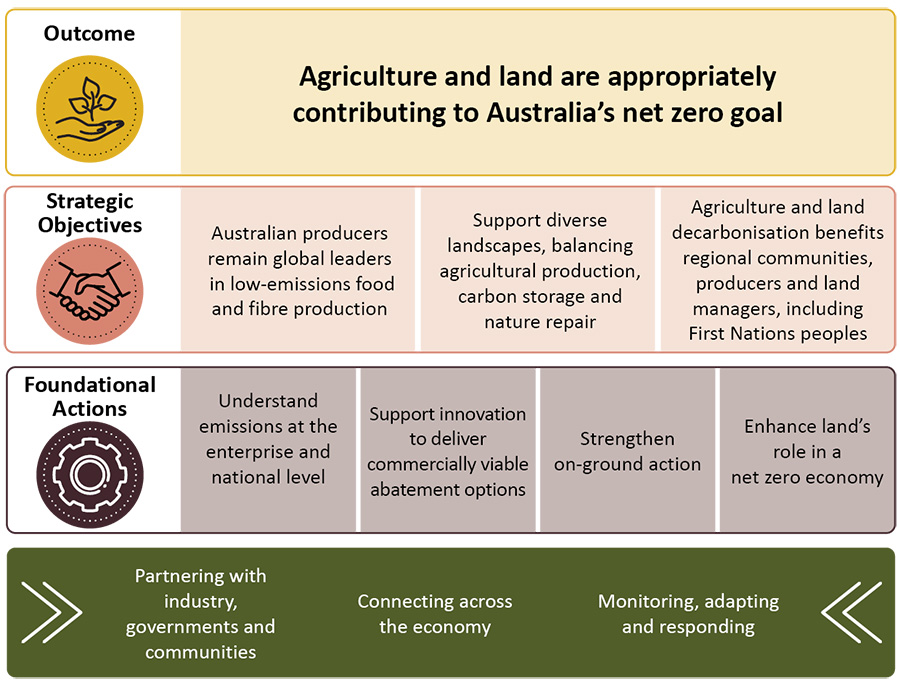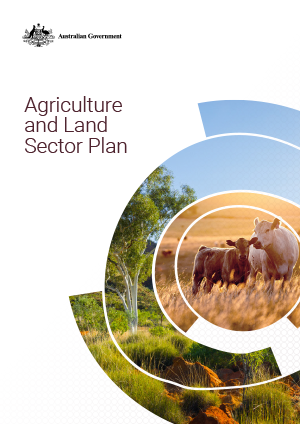The government has released the Net Zero Plan, guiding Australia’s transition to net zero greenhouse gas emissions by 2050. The Net Zero Plan shows how Australia can achieve a fair and orderly transition that builds on our strengths, and ensures all Australians benefit.
The Agriculture and Land Sector Plan is one of six sector plans supporting the Net Zero Plan. The sector plans provide more detail on Australia’s transition.
Agriculture and land have already made valuable contributions to Australia’s emissions reduction goals.
Our producers are already leading the world in low-emissions food and fibre production.
Further investments in productivity and sustainability will help ensure we can maintain this position in the global transition to lower emissions.
Through collective effort and strong industry leadership we can harness opportunities from Australia’s net zero transition.
Agriculture and Land Sector Plan
If you have difficulty accessing these files, please email climatepolicy@aff.gov.au.
The framework
The Agriculture and Land Sector Plan establishes a framework for the sectors to contribute to Australia’s net zero target. The framework includes three strategic objectives to underpin agriculture and land’s contribution to net zero:
- Australian producers remain global leaders in low-emissions food and fibre production.
- We must support diverse landscapes, balancing agricultural production, carbon storage and nature repair.
- Decarbonisation of agriculture and land must deliver real benefits for regional communities, producers and land managers, including First Nations peoples.
Four foundational areas for action will guide efforts and investment:
- understand emissions at the enterprise and national level
- support innovation to deliver commercially viable abatement options
- strengthen on-ground action
- enhance land’s role in a net zero economy.
These foundational actions are supported by a commitment to partnership, strong connections across the economy and ongoing processes for monitoring, adapting and responding.
Figure 1: Framework for agriculture and land to contribute to Australia’s net zero goal

Funding
The Australian Government is already investing across the four foundational action areas, including:
- $87 million to establish the Zero Net Emissions Agriculture Cooperative Research Centre (ZNE-Ag CRC).
- $4.4 million for the department to contribute to research through the ZNE-Ag CRC.
- $27.8 million to accelerate on-ground action through upskilling of trusted advisors, farmers and land managers in the Carbon Farming Outreach Program.
- $28.7 million to improve greenhouse gas accounting from the national to the farm level.
- An additional $1 billion for the Regional Investment Corporation. This will help to boost climate resilience, productivity and support agriculture to be part of the net zero transition.
Consultation
Stakeholder engagement was a core part of developing the plan.
Submissions to the Agriculture, Land and Emissions discussion paper have been published on the Have Your Say project page.
Additional stakeholder consultations held to inform development of the plan include:
- The Sustainable Agriculture Summit in May 2024.
- Agri-Food Supply Chains and Finance Roundtables in September 2024.
- Agriculture and Land Plan Stakeholder Roundtables in December 2024.

